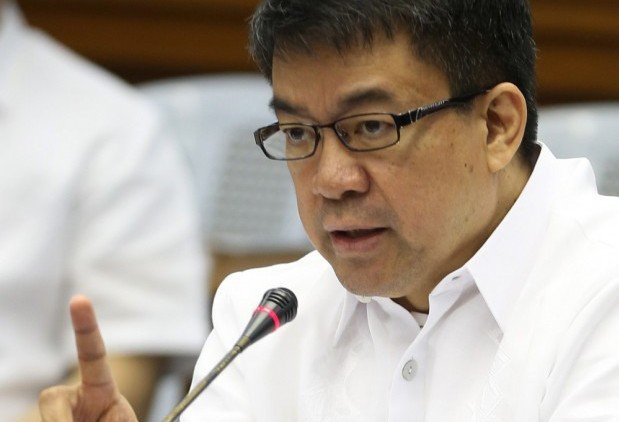
Senator Aquilino “Koko” Pimentel III. (File photo by NIÑO JESUS ORBETA / Philippine Daily Inquirer)
MANILA, Philippines — There are no Filipino spies in China, Senator Aquilino Pimentel III assured Monday after Chinese Ambassador to the Philippines Zhao Jianhua said overseas Filipino workers (OFWs) in the East Asian nation may be accused of spying.
Following an organizational meeting with the Department of Foreign Affairs (DFA), the chair of the Senate committee on foreign relations said in an interview: “Let me assure China, there are no Filipino spies in China. Kaya wag silang magalala, ang mga Pilipino po na nasa China ay para po sa pagta-trabaho.”
Over the weekend, Presidential spokesperson Salvador Panelo said that the Chinese envoy had texted him about concerns earlier raised by Defense Secretary Delfin Lorenzana regarding Philippine offshore gaming operators (POGOs).
Lorenzana had said China-manned gambling centers near military camps may shift their operations to spying.
“Ambassador Zhao sent me a text. He said, ‘What if we also think that your overseas workers are also spying on us. What can you say about that?’” Panelo said.
READ: Envoy to Panelo: What if China suspects OFWs of spying, too?
READ: ‘Preposterous’: Lorenzana hits China envoy’s remark on OFWs ‘spying’
However, Pimentel pointed out that there are more Filipinos residing and working in Hong Kong and Taiwan than in mainland China.
Figures presented by DFA during the organizational meeting showed that as of December 2018, there are only 15,376 Filipinos in mainland China.
Meanwhile, there are 233,288 Filipinos in Hong Kong; 151,759 in Taiwan; and 33,180 in Macau.
“Kung titignan po natin, na-subdivide po ‘yong mga Pilipino sa China, wala naman ang mga Pilipino sa China nando’n po sila sa Taiwan at nandun sila sa Hong Kong. So wala po sa mainland China, malayong-malayo sa Beijing, kaya wala po ‘yun, ‘wag po silang magalala,” Pimentel said.
The senator, however, also said that Zhao’s earlier statement on OFWs should not be a cause for concern.
“Para lang binalik nya ang accusation natin na: Paano kung nag-spy ang Pogo employees? Sabi nya (Zhao): Paano kung ganun din ang Filipinos? ‘Wag tayo mabahala, para lang ‘yon academic discussion,” he said.
‘Location-specific’
In terms of licenses issued to Pogos, Pimentel said it should be “location-specific.”
“Dapat ang Pogo license [ay] location-specific. ‘Di lang siya ‘yong ‘I am allowing to engage in off-shore online gaming’ but you must also be limited to a certain area,” he said.
Asked whether Pogos should be situated away from military bases, he said: “‘Yong reasoning na ilayo sa military bases dahil baka may high-tech equipment na ginagamit, so it makes sense.”
“Ilayo sa military bases, ilayo sa eskwelahan, ilayo sa simbahan, ‘yung mga ganyang basic rules,” Pimentel suggested.
“So that is Pagcor’s (Philippine Amusement and Gaming Corporation) call, binigyan sila ng kapangyarihan magbigay ng lisensya dyan. It must be location-specific,” he further said.
Earlier, Pagcor chair Andrea Domingo announced that the agency has suspended accepting applications for Pogos.
READ: Pagcor: No more Pogo applications, for now
“We will no longer, at this time, accept any more applications until we have reviewed and comfortably addressed all of the concerns of everybody,” Domingo said in a press conference on Monday. /kga